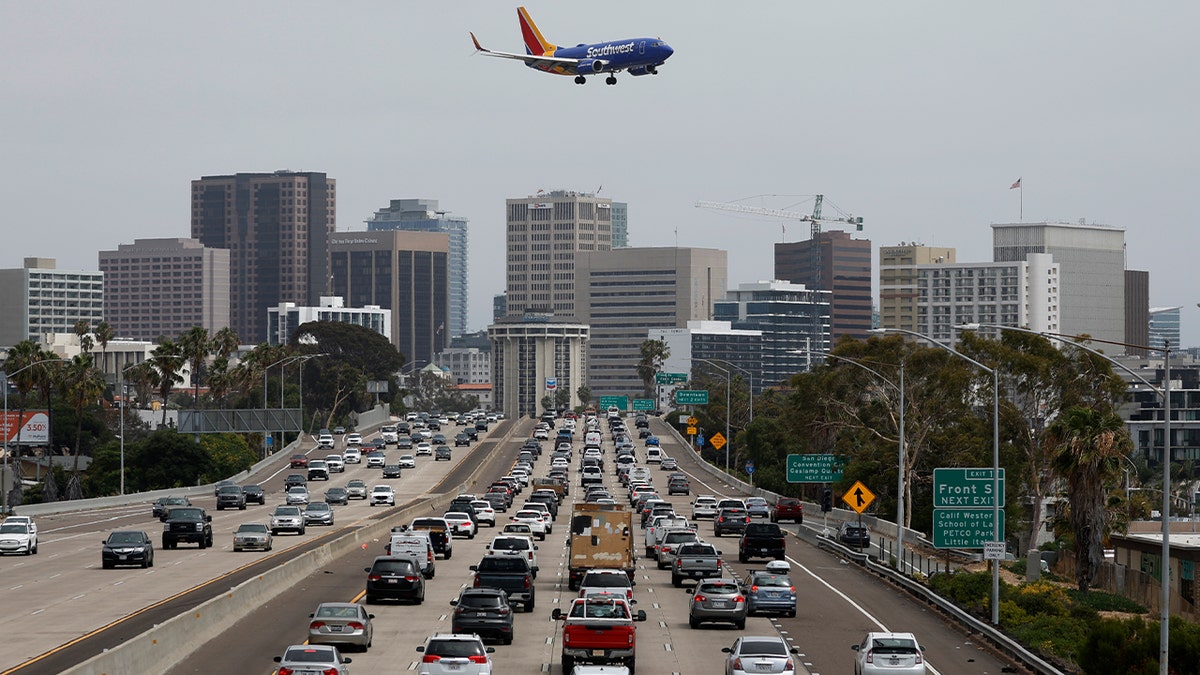A top California Republican lambasted the prospect of a 65-cent-per-gallon hike in gas prices next month, accusing the state’s energy resources board of being wealthy and out of touch with the working class.
Senate Minority Leader Brian Jones of San Diego cited an analysis reported in the Ventura County Star that new regulations up for a vote Nov. 8 will lead to the near-two-thirds-of-a-dollar hike.
“A governor who lives in idyllic Marin County, a millionaire CARB executive officer, and a Democrat-exclusive board filled with wealthy politicians, former politicians, and academics have set themselves up as judge, jury, and executioner,” Jones said.
The Republican added it seems the board members are looking down from their “ivory tower” at the “struggling middle class and working poor.”
SUNUNU NAMES TWO GOVERNORS ALL THE OTHERS HATE
“Their ‘we know what’s best for you’ attitude is infuriating for hardworking Californians who are already scraping by just to fill their tanks at current prices, let alone after this new hike.”
CARB – the California Air Resources Board – itself reportedly estimated the hike would come out to be 47 cents.
The regulations include stricter limits on carbon intensity in fuel, the paper said.
California already has the highest combined (local-state-federal) gas tax in the nation, at 87 cents, followed by Pennsylvania and Illinois at about 78 cents, according to a 2020 analysis by the American Petroleum Institute.
Jones quipped that he isn’t sure whether it is “arrogance, ignorance or both that the CARB politburo seems to be operating under” in regard to a major jump in already-elevated gas prices.
TOP REPUBLICAN DEMANDS ANSWERS FROM NEWSOM, FEDS OVER WRONGFUL MEDICAID PAYMENTS TO CERTAIN CA IMMIGRANTS
Ten of the 16 members are “considerably wealthier” than the average Californian, and Chairman Steven Cliff, who was also a Biden NHTSA appointee, is a millionaire, according to public records cited by the lawmaker.
Gov. Gavin Newsom, who appointed several of the members of CARB’s board, was recently asked whether he will require CARB to disclose the true cost of the gas hike.
“You’re the boss,” a reporter said. “I’m not the dictator,” Newsom replied.
“I think you heard exactly what I said — I think it’s important to be transparent.”
Additionally, state Sen. Rosilicie Ochoa Bogh, R-San Bernardino, and Assemblyman Greg Wallis, R-Riverside, urged CARB chair Liane Randolph to postpone its Nov. 8 vote until costs can be officially calculated.
The lawmakers noted that Californians pay an average $1.50 more per gallon than the Lower 48 average.
Meanwhile, state Sen. Henry Stern, D-Malibu, has defended CARB. In one exchange, he told a critic that he sits as the Senate’s ex-officio appointee on the board, and that innovation and competition drive down costs.
“It’s wrong to assume there will be a downstream impact of oil’s compliance with LCFS (though they’ve spent millions propagandizing this warning). Electric vehicles used to be expensive. Now they’re mainstream. Renewable diesel used to be pricey. Now it’s competing with petroleum diesel. That’s why they really want to end LCFS and the regulators who enforce it,” Stern wrote on X, the platform formerly known as Twitter.
Stern recently told KCRA that CARB is “not necessarily good at communicating this to the public. And that’s where folks like me come in and cut through it a bit.”
Amid the back-and-forth, two major oil companies reportedly may be closing refineries in California.

Last week, Phillips66 announced it would shutter a refinery in Los Angeles, according to OilPrice.com. Now, Valero is reportedly citing regulatory pressures from the Golden State government and leaving “all options on the table,” according to the energy news site.
The frustration with CARB’s work extends beyond Republican circles. Democratic Assembly member Wendy Carrillo of Los Angeles sharply criticized the board for its lack of transparency, echoing concerns raised by an NBC reporter who was repeatedly denied interview requests.
“When I chaired the Assembly Budget Committee on State Administration, one of my biggest frustrations were [agencies] and departments asking for funding but weren’t prepared [with] data and lacked transparency at public hearings – a direct result of laws ceding legislative oversight to administration,” Carrillo said.
CARB did not respond to a request for comment.
Read the full article here










